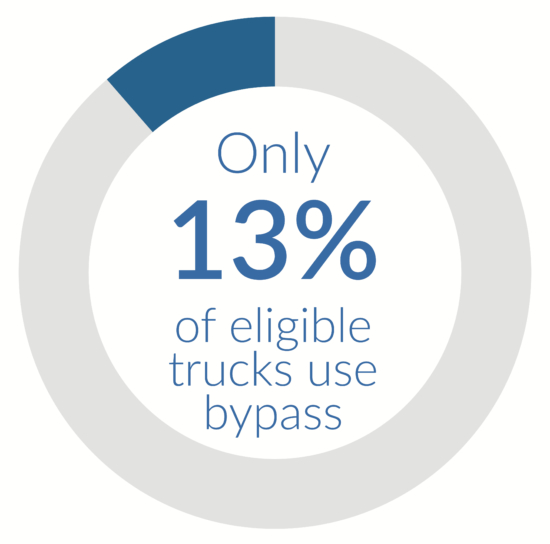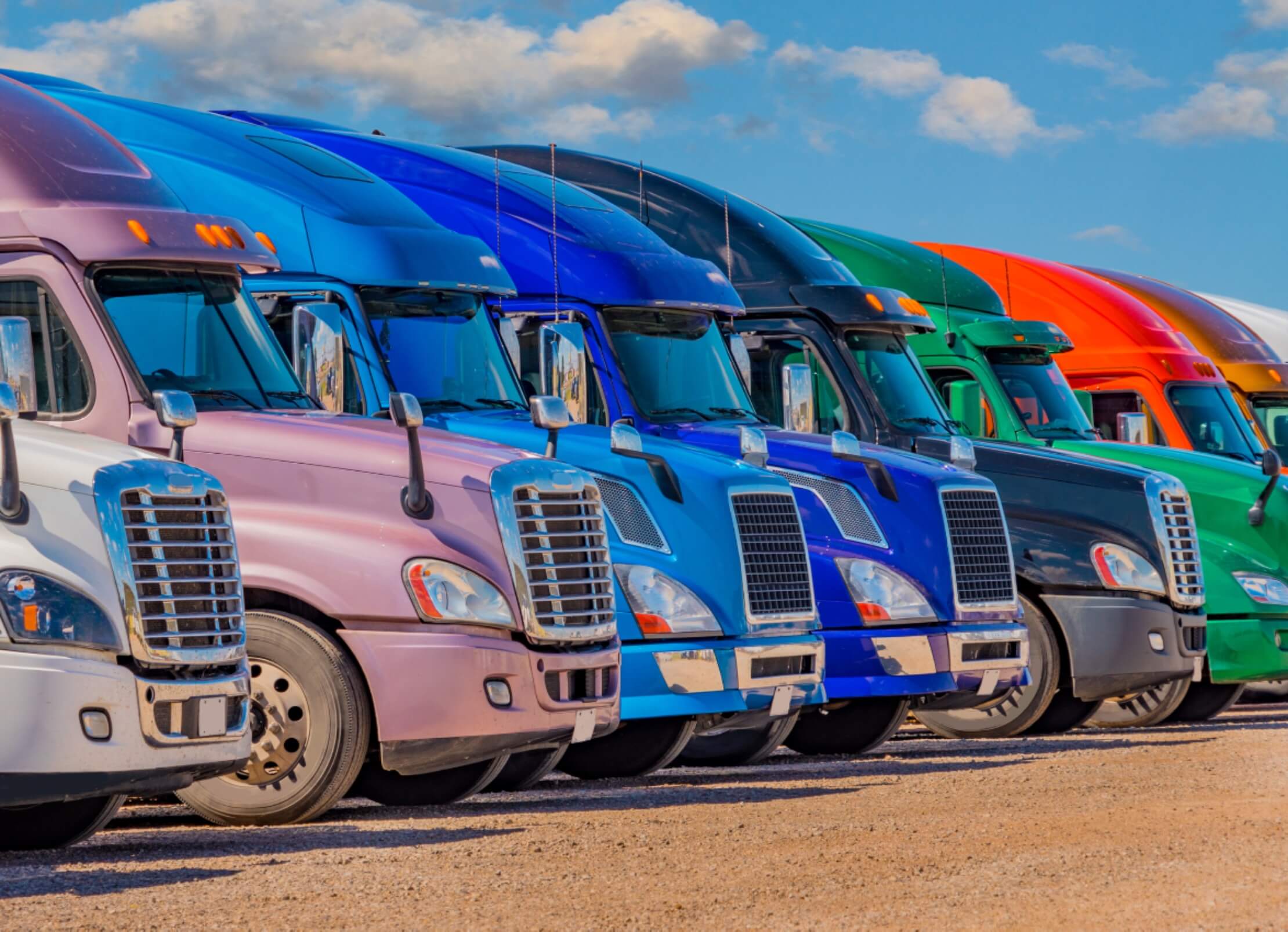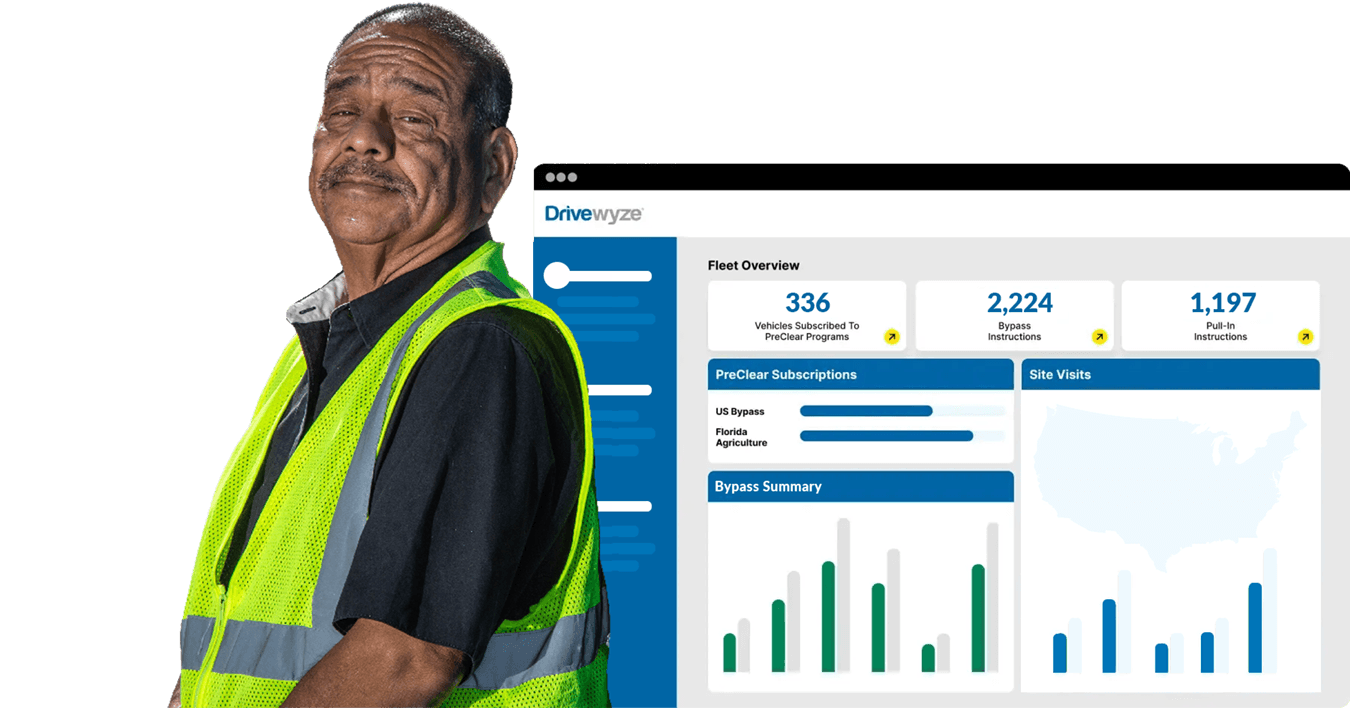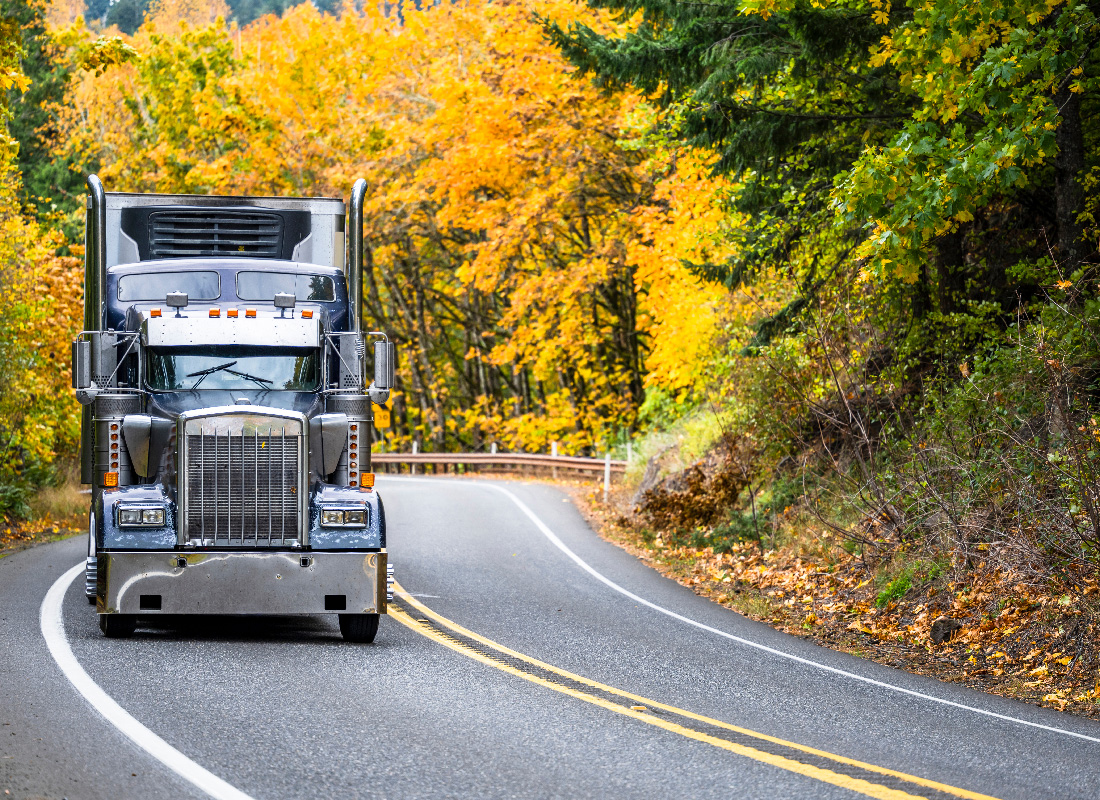The operational benefits of deploying a fleet-wide weigh station bypass service are often apparent: time savings, fuel and operational cost savings, increased fleet efficiency, improved driver satisfaction.
The often overlooked safety benefits of a weigh station bypass service are just as impressive:
• Improve driver safety
• Protect and leverage safety score
• Contribute to public safety
Enhancing Driver Safety with Weigh Station Bypass Services
Merging in and out of traffic in order to enter and exit a weigh station is a serious driver safety issue. Drivers unfamiliar with a route are often surprised to encounter a weigh station on an unfamiliar stretch of highway, and may have to battle aggressive bumper to bumper car traffic in order to find a safe path to the scale house.
And when a weigh station gets busy, the lineup of trucks backing up onto the interstate compounds the problem. At particularly busy sites, commercial truck traffic can line up half a mile or more, causing a potential safety problem for both commercial truck drivers and the motoring public.
A weigh station bypass service can reduce these risky situations by keeping trucks on the mainline, but carriers need to be aware that some bypass services can be safer than others.
Transponder based bypass programs require drivers to pull into the right lane so that they can pass under a transponder reader pole. Jockeying for the right lane, in time to pass under the pole, can be a stressful and potentially dangerous endeavor.
Drivewyze PreClear is GPS based and therefore doesn’t require a driver to be in any specific lane. As well, it provides 2 mile and 1 mile in-cab notifications in order to give the driver plenty of time to navigate a truck safely into a weigh station, if necessary.
Reducing Incidences of Weigh Station Avoidance
Avoiding an open weigh station can be a serious offence with serious implications for both a driver and a carrier’s CSA score. But it happens all the time, accidentally, when drivers are pre-occupied, driving in an unfamiliar location, or overlooking road signage.
Drivewyze helps eliminate this problem by providing “Heads Up” notifications in advance of over 1200 fixed weigh stations and mobile inspection sites across the country. Even if a site is not participating in the Drivewyze bypass program, Drivewyze still provides an audible and visual alert to the driver when the site is 2 miles away.
Fleets using Drivewyze have noticed that these in-cab “Heads Up” alerts are helping reduce the number of incidences of “accidental weigh station avoidance,” improving their CSA scores as much as 5%.
Industry Safety Benefits of a Voluntary Bypass Program
There is a reason why state law enforcement agencies participate in weigh station bypass programs, and why Drivewyze has grown so quickly. That’s because, at its heart, a bypass program is really a voluntary compliance program, in which a carrier agrees to provide a minimal amount of vehicle and carrier information in advance of an inspection site, in exchange for pre-clearance and a potential bypass.
For carriers, this means that even those with less than perfect safety scores can still enjoy a percentage of bypasses, by participating in a bypass program. The information that they share with law enforcement, through Drivewyze, is minimal:

Drivewyze never shares driver information, hours of service, CDL, or any other location based data with law enforcement.
In exchange for providing a minimal amount of data up front, fleets are eligible to receive a percentage of bypasses. Bypass rates vary by state and by site, but in general those carriers with even very poor safety scores can expect to receive bypasses 30% to 40% of the time, while those with exceptional scores can receive bypasses up to 98% of the time at Drivewyze sites.
In turn, this allows state law enforcement personnel to focus more attention on non-participating trucks that need a higher level of scrutiny, while participating trucks only pull in from time to time. Each state employs a random inspection rule, meaning that sooner or later every Drivewyze-enabled truck is going to have to pull in. But because a carrier has registered with the program, the state agency has some level of comfort in not having to pull them in every single time.
Safety Benefit to the Public
In the same way that a backed up scale house can cause a traffic congestion issue, a backed up scale can also cause an even more serious public safety concern –a weigh station shut down. When this happens, many trucks will end up avoiding potentially critical inspections. Ask any commercial vehicle enforcement officer, and they’ll tell you they’d rather have carriers they know get fair and legal bypasses, thus reducing the congestion at a scale house, rather than let unknown carriers drive by without any scrutiny, because they simply don’t have the manpower to process every truck.
Leveraging Weigh Station Bypass to Protect Your Safety Score
Safety managers work hard to earn a good safety score, and for them a bypass service like
Drivewyze PreClear provides a way to benefit from their efforts. Reducing pull ins, saving time and money, and improving driver safety, are excellent rewards for building and managing a safe fleet.
And yet, of the 4.7 million bypass eligible trucks on the road, only 600,000 are participating. Why?

Many carriers or owner-operators don’t believe they have a good enough safety score to participate in a bypass program, while others believe that staying out of weigh stations can worsen their safety scores by reducing the number of potential opportunities for clean inspections.
In reality, law enforcement understands that building a good safety score is a continuous process, and have established bypass screening rules so that even carriers with poor safety records can participate, and enjoy a number of bypasses.
While pulling into weigh stations and getting clean inspections, and the passage of time, can improve safety scores, a carrier doesn’t need to have its entire fleet pulling in to see an improvement. Because carriers who participate in a bypass program always have some of their trucks randomly pulled in a portion of the time, clean inspections can still be realized even while most trucks are getting bypasses. And it is important to understand that when seeking clean inspections to improve CSA scores, there comes a point of diminishing returns when additional inspections stop making significant further positive impact. At this point fleet-wide pull ins become an unnecessary burden for a carrier, outweighing any incremental score improvements.
It is also important to note that the FMCSA has recently started randomly manipulating ISS scores for carriers – particularly smaller ones that don’t have enough inspection data registered in the system. By temporarily increasing a carrier’s ISS score, the FMCSA ensures that such carriers are more likely to be pulled in for an inspection, thus satisfying some ongoing data sufficiency problems within the FMCSA model. See:
[http://www.overdriveonline.com/are-small-carriers-singled-out-for-inspection-short-answer-yes]
Talk to Drivewyze About Safety
With Drivewyze you can deploy a company wide weigh station bypass program to help your fleet become a leader in driver and public safety, while also supporting your strategy for ongoing safety score improvement. Drivewyze will let you pick and choose which trucks participate in the program, or which portions of the fleet participate, without having to move transponders around. This means you can continue to pull your trucks in at a rate that you believe will support your safety objectives, while ensuring your fleet does not incur unnecessary costs in terms of time, money, or driver safety.

Ready to Get Started?
Learn how North America’s leading carriers use Drivewyze to save money and improve safety.


